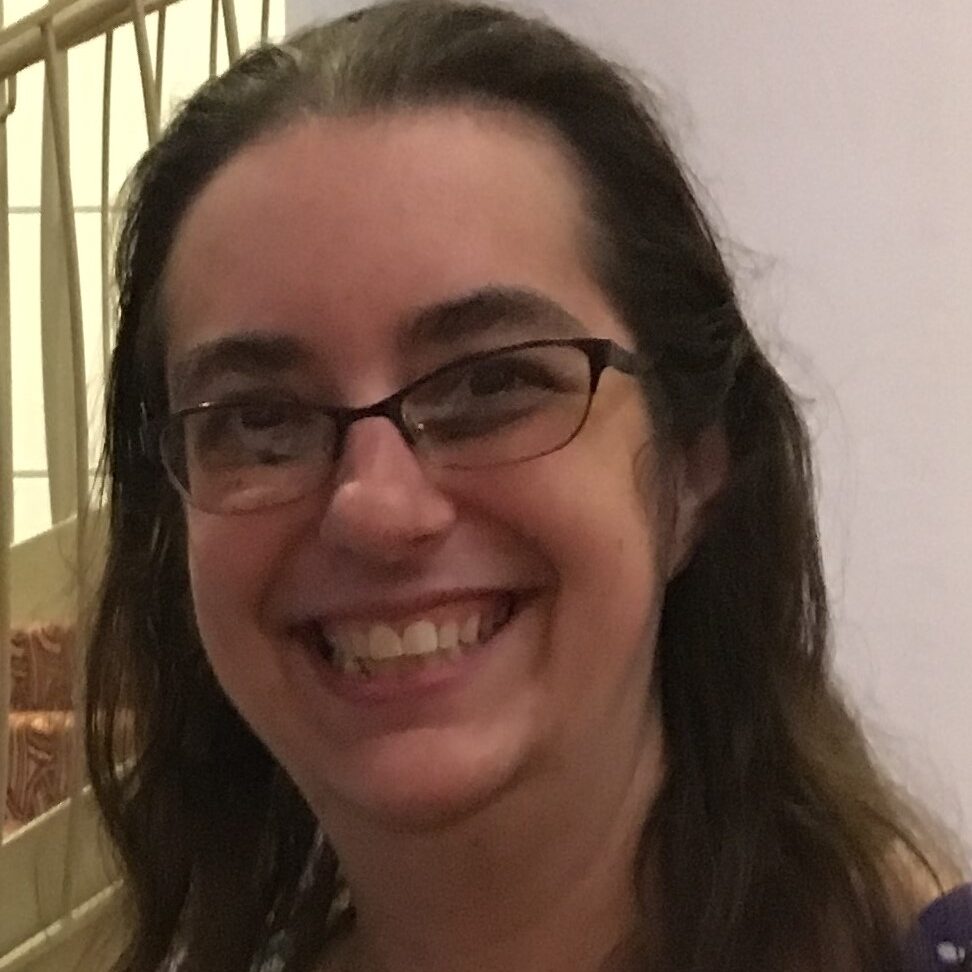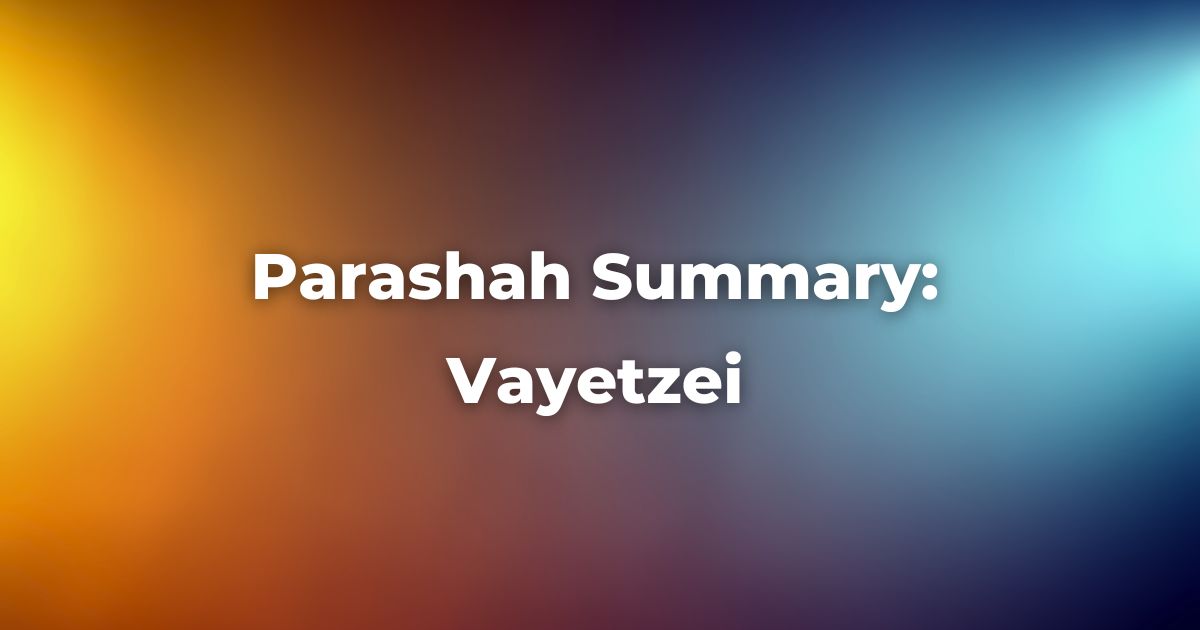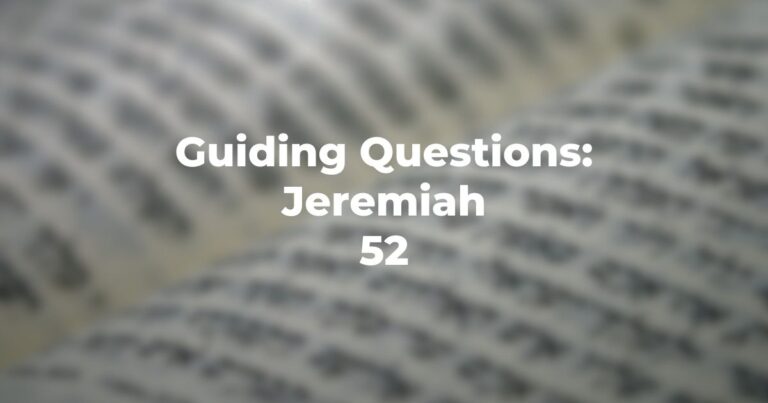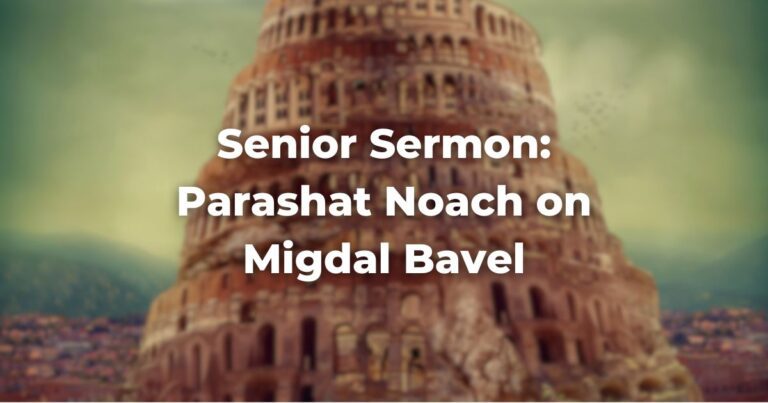Summary
Jacob has a dream and receives a promise from God. Jacob works for Laban, marries Leah and Rachel, tends to the flocks, and fathers many children. Twenty years later, he leaves Laban to return to his birthplace.
Aliyah-by-Aliyah Summary
1st Aliyah: Genesis 28:10-22
Jacob leaves home and travels toward his uncle Laban. He stops for the night, uses a stone for a pillow, and dreams of a stairway that reaches to heaven with angels going up and down it. God appears in the dream and promises Jacob and his descendants the land on which he is sleeping. God also reminds Jacob that he has God’s protection wherever he goes. When he wakes up, he exclaims, “Surely, God is in this place, and I did not know!” and then marks the site’s holiness with the name Beth-El (the House of God).
2nd Aliyah: Genesis 29:1-17
Jacob resumes his journey and arrives in Haran. He comes to a well used for providing the local flocks of sheep with water and the mouth of the well is covered by a big stone. When Jacob sees Rachel with his uncle Laban’s flock of sheep, he moves the stone and waters them. Jacob breaks into tears and tells Rachel who he is. When Laban hears this, he runs to meet him and take him to his home. After staying a month, Laban offers to compensate Jacob for his work if he is to stay.
3rd Aliyah: Genesis 29:18-30:13
Jacob loves Rachel and offers to work for seven years so he can marry her. After seven fast years, Laban gathers everyone for a wedding, but tricks Jacob by switching his new bride with Leah (and not Rachel). Jacob confronts Laban, and they agree that in a week, Jacob can marry Rachel if he will work for him for another seven years. Leah and Rachel bring their handmaids, Zilpah and Bilhah with them.
Leah begins having children (Reuven, Simon, Levi, and Judah) while Rachel remains infertile. Rachel is jealous of her sister and begs for children. She offers her maid Bilhah to Jacob as a concubine, and she gives birth to sons (Dan, Naphtali). Leah stops conceiving, so she gives her maid, Zilpah, to Jacob as a concubine. Zilpah also gives birth to sons (Gad, Asher).
4th Aliyah: Genesis 30:14-27
Reuven brings Leah, his mother, some mandrakes, which Rachel desperately wants. Leah agrees to give Rachel mandrakes in exchange for a night with Jacob. Leah gives birth, again (Isaachar, Zebulun, Dinah). Rachel gives birth to Joseph. Jacob requests permission to return to his homeland.
5th Aliyah: Genesis 30:28-31:16
Laban asks Jacob what wages he owes, and Jacob says that Laban doesn’t have to pay him. Instead, he asks to go through the flocks and take the speckled and dark-colored sheep. Laban agrees but then tries to cheat Jacob by removing the speckled and dark-colored ones from his flock and giving them to his sons. Jacob then sets up two rods, and all the animals that mate near the rods give birth to spotted offspring. Laban’s sons call Jacob a thief because they thought they were the only ones with striped and spotted animals in their flocks. God tells Jacob it’s time to return to where he was born.
6th Aliyah: Genesis 31:17-42
Jacob sets out with his wives, children, and livestock to return to his family in Canaan without telling Laban. When Laban finds out three days later, he pursues them. God warns Laban to avoid doing “anything good or bad.” Laban catches up and asks why they left in secret and stole his household idols. Jacob explains that he is concerned that Laban will take back his daughters by force and denies knowledge of the idols. He allows Laban to search for the idols, not knowing that Rachel has taken them. Rachel places the idols inside a cushion and sits on them.
7th Aliyah: Genesis 31:17-42
Laban makes a pact with Jacob to let bygones be bygones. They build a pillar of stones and Laban reminds Jacob that God will see if he mistreats his daughters. (Maftir: Genesis 32: 1-3) Laban kisses his daughters, and they part ways. Jacob encounters God’s messengers.
Triennial Breakdown
Note: For more information about the tradition of spreading the TorahRefers to the first five books of the Hebrew Bible, the Tanakh, also called the Five Books of Moses, Pentateuch or the Hebrew equivalent, Humash. This is also called the Written Torah. The term may also refer to teachings that expound on Jewish tradition. Read more readings over a 3-year cycle see here.
| Aliyah | Year 1: 28:10-30:13 | Year 2: 30:14-31:16 | Year 3: 31:17-32:3 |
|---|---|---|---|
| 1 | 28:10-28:12 | 30:14-30:16 | 31:17-31:21 |
| 2 | 28:13-28:17 | 30:17-30:21 | 31:22-31:24 |
| 3 | 28:18-28:22 | 30:22-30:27 | 31:25-31:35 |
| 4 | 29:1-29:8 | 30:28-30:36 | 31:36-31:42 |
| 5 | 29:9-29:17 | 30:37-30:43 | 31:43-31:45 |
| 6 | 29:18-29:33 | 31:1-31:9 | 31:46-31:50 |
| 7 | 29:34-30:13 | 31:10-31:16 | 31:51-32:3 |
| Maftir | 30:9-30:13 | 31:14-31:16 | 32:1-32:3 |
Triennial Summaries
Year 1: See Aliyot 1-3
Year 2: See Aliyot 4-5
Year 3: See Aliyot 6-7
Haftarah Summary
Haftarah: Hosea 12:13-14:10
Hosea relates how Jacob fled to Aram where he guarded sheep and got a wife. When God brought Israel out of Egypt, Ephraim (referring to the tribes of the northern kingdom) sinned and turned to idol worship. God chastises Israel and begs them to return to following God’s ways.
See our Haftarah breakdown here.
Author
-

Rabbi Suzanne Brody is a passionate Jewish educator, writer, reader, and crochet enthusiast. She is the Director of Ithaca Beit MidrashLiterally, “house of study,” it refers to a school or a communal study hall. Plural: Batei Midrash Read more (www.ithacabeitmidrash.com) and hopes you’ll join her for a class or two! Rabbi Brody is also the author of multiple books of poetry and fiction (available on Amazon). When she is not at her computer or by the lake writing, Suzanne can be found teaching in both formal and informal Jewish educational settings or enjoying time with her husband, their two teens, and cuddling with their dogs and cats.
View all posts https://www.amazon.com/s?k=suzanne+brody&crid=20HPAG70405E9&sprefix=suzanne+brody%2Caps%2C207&ref=nb_sb_noss_1





